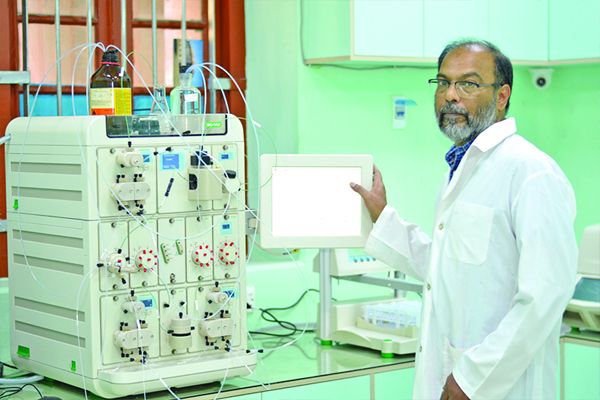Newly-invented ‘Eco-friendly Tech’ to Benefit Textile Industry
Published on by Water Network Research, Official research team of The Water Network in Technology
Dr Mohammad Taufiq Alam, a professor at the Applied Chemistry & Engineering Department in Rajshahi University (RU), has recently invented environment-friendly technology that can be used in the textile industry of Bangladesh.

Image by The University of Rajshahi
Prof. Taufiq has claimed that the technology will play a positive role in creating an environment-friendly apparel sector Generally, the textile industry is harmful for the environment because the industry consumes a huge quantity of water, thus posing a threat to the environment.
However, the environment would not be affected much if the new technology was used, Prof Taufiq said.
In a study, Prof Taufiq has revealed that textile industries in the country consume double the water used by the people of Dhaka city. On the one hand, the textile industry pollutes the environment and, on the other hand, huge quantities of water are wasted.
“We have invented a technology that is ‘eco-friendly’ or ‘environmentally friendly’. It will be less harmful for the environment and 45 per cent of water will be saved,” Prof. Taufiq said. Sources have said Dr Shamim Ahmed, a professor of the same department and seven students assisted Dr Taufiq in the research. Among the students, two are PhD fellows and five are MSc thesis group students. The research team has demonstrated their innovation after working for the past four years.
The price for goods is a big issue in the textile industry.
The team has found a method to reduce price which, they say, involves an “enzymatic method”. Enzyme is a protein molecule that works to increase the speed of production at any level.
“Once these proteins go into the environment they would be very useful both for the environment and fish. This is why it is ‘environment-friendly’. In this case, the quality of goods and prices will be taken care of. Prof Taufiq has said that before the colouring of the clothes, a textile engineer’s first job is to remove the oil layer from the production line. For that, there is an enzyme for oil hydrolysis. Oil becomes fatty acid when it is hydrolyzed. Fatty acids are very beneficial for animals and birds.
However, before the clothes are dried, the clothes have to be a little white. The device to measure the whiteness can be observed by researchers for a certain amount of time. Many researchers can carry such research work at 51.05 per cent to 51.75 per cent. “But, through our ‘Enzyme Activator’, we were able to go up to 90 per cent of the research work. Scientists think that this is the highest level achieved.
Regarding the weight of the cloth, the professor said, “If we lose less cellulose in clothing, the weight is also reduced. And in our ‘Enzymatic Method’, the weight of the clothes will be reduced. We hope the textile industries will be benefited from our technology.” He also added: “Foreign buyers buy clothes from our textile industry by weight. Apart from this, many clothes have to be of light shades. If we do light shades, then the cloth gets a kind of yellowish look, which cannot be seen with naked eyes.”
As a result, foreign buyers do not want to take those clothes.
But if we use this enzymes (which is 90 per cent), then there would not be any yellowish tint in that cloth. In this case, they (the textile industries) will be benefited greatly, he added.’
Prof Taufiq Alam and his team have used the technology successfully in several textile factories of Bangladesh over the past few months. Apparel companies have expressed interest in testing this technology in their factories.
Source: The University of Rajshahi, Department of Applied Chemistry & Chemical Engineering
Media
Taxonomy
- Industrial Water Treatment
- Industrial
- Industrial Water Treatment
- Industrial Water Managment
- Sustainable Water Resource Management
- Environmental Impact Assessment
- Chemical Analysis
- Fibers & Textiles
- Water
- Textile Machinery
- Textile
- Packaged Water Treatment System
1 Comment
-
Sir can you please share more details on this at techairmart@gmail.com